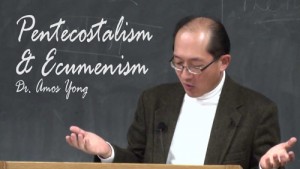Pentecostalism and Ecumenism: Past, Present, and Future (Part 3 of 5) by Amos Yong
Amos Yong challenges classical Pentecostals to re-examine what ecumenism really is.
III. Ecumenical Pentecostalism: A Historical Overview
I hope to have shown that Pentecostal anti-ecumenism stems in part from theological convictions imported into rather than derived from the Pentecostal experience of the Spirit. Such importations have inhibited Pentecostals from a genuine understanding of what the biblical ecumenism stands for. On the other hand, it has also certainly been the case historically that there has been a lack of spiritual fervor within the mainline churches, especially in terms of how Pentecostals gauge these expressions. Going back to the biblical material in section I, however, this should come as no surprise. Different communities of faith bring different gifts to the one body of Christ. It goes without saying that these various communities also bring different liabilities and have diverse struggles.
My goals in this and the next section are threefold. First, I would like to demonstrate that Pentecostalism and ecumenism have not been inherently antithetical historically. This historically oriented presentation supplements the biblical and theological arguments presented in the first two sections. Secondly, I want to make a similar case on behalf of the ecumenical movement. I wish to show that historically, ecumenists have shared many of the convictions and goals of Pentecostals. Third, however, I also want to demonstrate that the devil is at work not only on “their” side but on both sides of the fence. The history of God’s work among the people of God always features both triumphs and failures, and this applies to both ecumenists and Pentecostals alike.11
Let me begin with what I call “ecumenical Pentecostalism.” I want to focus in what follows on the ecumenical character of Pentecostalism in three stages. There is, first, the ecumenism of the Azusa Street revival. Second, there is the ecumenism of the charismatic renewal. Finally, there is the ecumenism now inherent within a Pentecostalism that has grown to be a global phenomenon. Let me overview each in order.
Category: Ministry, Pneuma Review, Summer 2001



